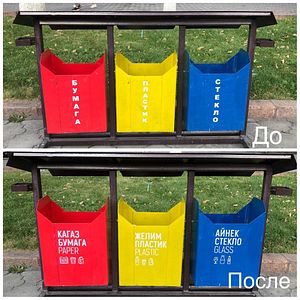On July 2, Bishkek’s municipal initiative Tazalyk (“cleanliness” in Kyrgyz) installed 10 sets of recycling bins across Kyrgyzstan’s capital. Almost three weeks later, on July 19, Tazalyk had put the finishing touches on the bins — trilingual labels and visuals, prepared by local artist Dmitriy Bondarev.
City officials eventually plan to install between 300 and 500 additional recycling bins – which cost 12,000 Kyrgyz som (approximately $175) each – in central Bishkek. Until then, as deputy administrator of Bishkek’s Pervomaiskii district Mavlyan Askarbekov told local reporters, “Right now our main task is to teach residents to sort their trash.”
Undoubtedly, teaching Bishkek residents to sort their ice cream wrappers from finished newspapers while out for a stroll on one of the city’s main streets is important, but there are certainly bigger fish for Askarbekov and Tazalyk to fry when it comes to environmental protection.
The bins Tazalyk has installed so far are not for household trash; they are tiny, meant for garbage accumulated while out and about. Even if behavioral change happens with regards to the new bins, it does not necessarily translate to the scale of households or apartment buildings. Furthermore, it will be difficult to measure the effect of this initiative on recycling rates. Kyrgyzstan’s government has not collected any data on recycling in the past, meaning there is no baseline rate for comparison.
That is not to say recycling is not happening at all in Kyrgyzstan, though. Indeed, the country’s capital is home to a sizable informal garbage management chain. In 2018, local media outlet Kaktus reported on Bishkek’s parallel trash collection system; they estimated that 5,000 scavengers, many of whom work in teams to be more efficient, sift through trash looking for plastic and cardboard every day. They sell what they find to black market collectors, who in turn sell the trash to recyclers, many of whom operate in neighboring China.
Given the scale of the black market trash collection system – as well as how Kyrgyzstan’s government has struggled with environmental protection laws and sustainable infrastructure projects in the past – it seems unlikely that Tazalyk’s new sorting bins will make much of a splash in total trash and recyclable collection rates anytime soon.
Even if local authorities could overtake the black market trash collectors, Bishkek currently lacks the capacity to handle separated trash collection on its own. The city has been trying to build a new sanitary landfill since 2011; in 2013, Kyrgyzstan’s government received a large loan from the European Bank for Reconstruction and Development, but in 2019 the Bishkek Prosecutor’s Office opened a criminal case to investigate corrupt use of funds from the bank.
Even if the city had a better landfill to store trash, it is not clear what entities would actually process recycling. Askarbekov told reporters that the plan is for private companies to manage the recycling from the newly installed bins. He did not specify which private companies nor the facilities they will use to process the recycling, however. As of 2012, Tazalyk held an average of 90 percent of the market share across commercial and residential segments; other than Tazalyk and the shadow trash collection companies, no business with sufficient capacity exists to handle the volume of Bishkek’s sorted trash.
Of course, problems with capacity and infrastructure related to recycling are not unique to Bishkek. Cairo’s trash collection also relies on an informal market. The city, which has a population of nearly 20 million people, relies on a community of Coptic Christians called the Zabbaleen (“garbage people” in Egyptian Arabic) to manage its garbage collection. The Zabbaleen have been collecting and sorting trash in Cairo for over 70 years, and the few attempts at government intervention to control the informal sector have backfired.
Infrastructure challenges also plague other, more developed countries in their efforts to reduce and recycle waste. For example, many municipalities in the United States have found they simply can’t afford to be environmentally responsible. In the past, rather than develop local recycling infrastructure, the U.S. had shipped most of its recycling to China to be processed into new products. But since China restricted imports on certain recyclables in 2017, many American towns have opted to throw plastic and paper that citizens separated from other trash at home into landfills.
While the installation of the first few recycling bins appeared to be a hit on Bishkek’s social media accounts, the fact remains that it’s going to take more than brightly colored boxes and well-designed labels on Bishkek’s main streets for this recycling initiative to be a meaningful element within a broader government effort to protect the environment.

































